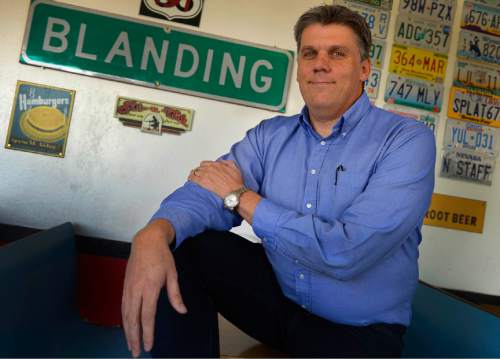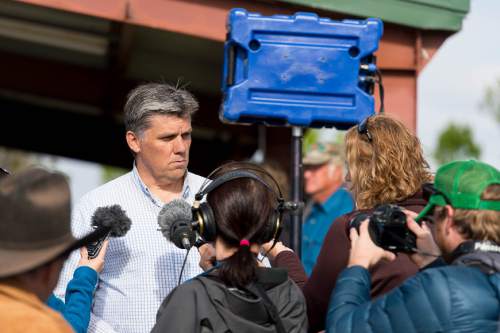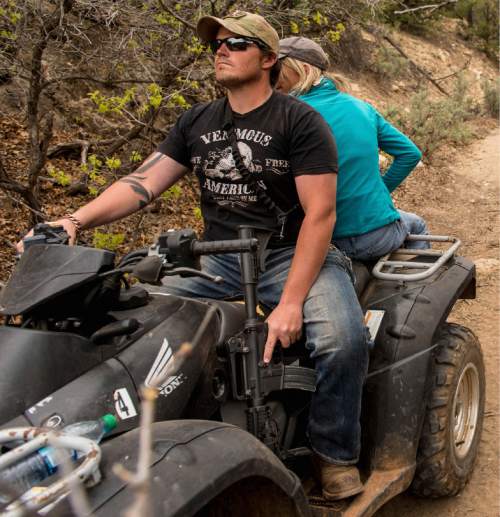This is an archived article that was published on sltrib.com in 2014, and information in the article may be outdated. It is provided only for personal research purposes and may not be reprinted.
Phil Lyman can afford to hire his own lawyer and pay back the federal government for the legal services provided him so far at taxpayers' expense.
After questioning the San Juan County commissioner privately about his finances Tuesday morning in Salt Lake City's federal court, U.S. Magistrate Judge Evelyn Furse ordered Lyman to cover his own defense.
Lyman, along with three other local men, faces misdemeanor conspiracy and trespassing charges stemming from a May 10 protest he organized where dozens of peopled motored into Utah's Recapture Canyon in defiance of the U.S. Bureau of Land Management's decision to close it off.
A conservative Republican who rails against federal oversight of Utah's public lands, Lyman was re-elected last month to a second term on the county commission, which includes compensation worth $50,000.
Based on a one-page financial disclosure form he submitted at his initial appearance in October, Furse had concluded he lacked the resources to retain counsel and appointed federal defender Kent Hart to represent him. So far, Hart has spent 50 hours on the case.
But Furse reversed her decision Tuesday after reviewing a challenge raised by prosecutors and instructed Lyman to find a new lawyer.
In a statement e-mailed to the press Dec. 26, Lyman said he was disappointed with the decision, not from a financial standpoint, but as a setback to his defense because he has spent time so much time building a relationship with the federal defender. He explained that the judge had led him to believe he would be required to pay for these court-provided legal services based on his ability to pay.
"I have never attempted to get 'free' legal counsel, or to game the system," he wrote.
But prosecutors doubted Lyman should ever have been appointed counsel in the first place since he has three streams of revenue and holds real property assessed at $650,000.
Assistant U.S. Attorney John Huber wondered at Tuesday's hearing how a gainfully employed accountant who owns a 5,400-square-foot home perched on 5.5 acres could be eligible for a government service reserved for the indigent.
"He doesn't appear to be the type of person who would qualify for these limited and valuable resources we are stewards over," Huber said. "He should not be taking this valuable asset from the community if he has the ability to hire his own attorney.
"It is an awkward situation. We rarely raise this question," Huber added. "By no means do we intend to harass Mr. Lyman or embarrass him."
Federal court rules give judges latitude in determining whether defendants' "net financial resources and income are insufficient to obtain qualified counsel." Any doubt as to a defendant's eligibility are to be resolved in their favor. "Erroneous determinations of eligibility may be corrected at a later time," the rules state.
Furse has appointed attorneys for Lyman's three remaining co-defendants. Charges have been dismissed against Jay Redd, the one defendant who hired his own lawyer.
The men have been charged with offenses that carry penalties of up to one year in jail and $100,000 in fines. Trial is set to start March 24.
Lyman's federal defender argued Tuesday that prosecutors appear to be interfering in his attorney-client relationship.
"We are concerned that the government's interest here is beyond just a financial concern. I don't think it's their business to make indigence determinations," Hart said.
But the prosecutors, who have no access to defendants' financial disclosures, said they were raising questions based on publicly available information.
For instance, Lyman's advertising indicates he owns an investment firm that manages $2.3 million in assets and holds him out as the premier CPA in the Four Corners region, Huber said.
Lyman's numerous pieces of property include a 7,200-square-foot building whose tenants include a Subway sandwich shop and a historic building rented by a lawyer, according to San Juan County Assessor Howard Randall.
The Subway building and the .38 acres it sits on are assessed at $64,000. Randall had assessed the property for substantially more, but the San Juan County Commission sided with Lyman when he demanded a reduction, Randall said.
Last fall, at the same time he claimed he lacked money to hire a lawyer, Lyman gave $1,000 to Randall's opponent in the Nov. 4 election, according to campaign finance disclosures. After 12 years in office, Randall lost.











